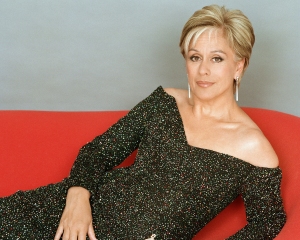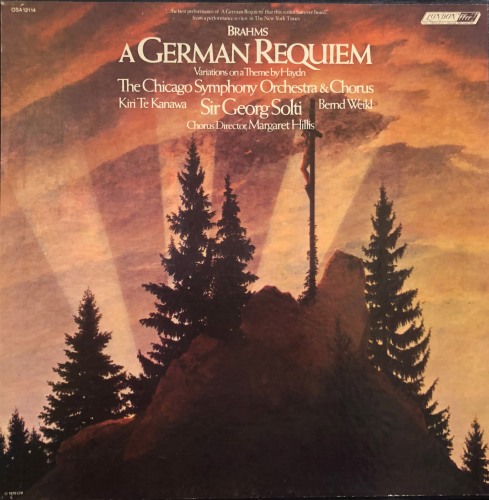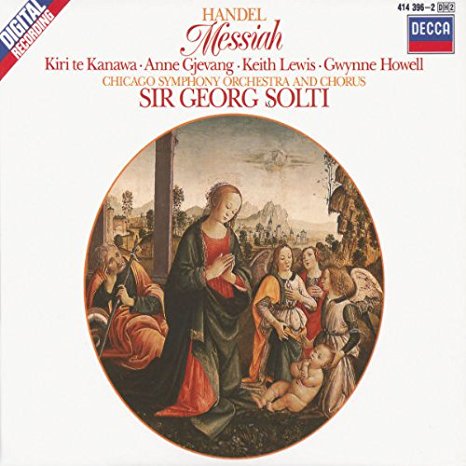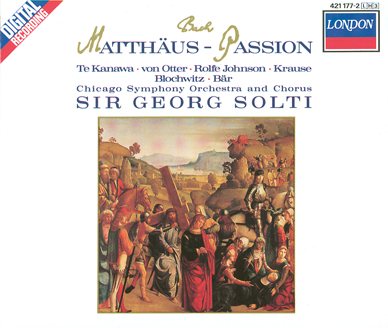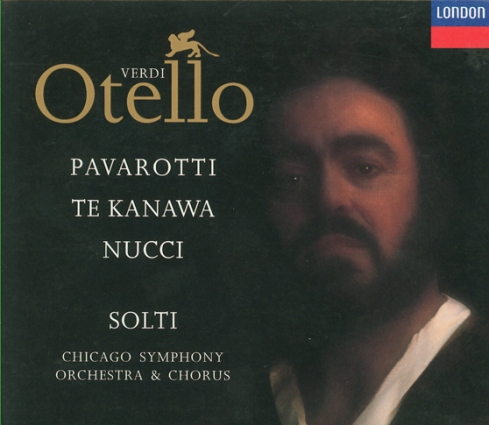You are currently browsing the tag archive for the ‘London Records’ tag.
The Chicago Symphony Orchestra family wishes the magnificent pianist and conductor Vladimir Ashkenazy a very happy eighty-fifth birthday!
Ashkenazy catapulted onto the world stage in 1955 after winning second prize in the International Chopin Piano Competition in Warsaw. He was awarded first prize in both the Queen Elisabeth Competition in Brussels in 1956 and the International Tchaikovsky Competition in 1962.
“Pound for pound, he may be the most pyrotechnic pianist in the whole world,” wrote Seymour Raven in the Chicago Tribune, following Ashkenazy’s Orchestra Hall recital debut, presented under the auspices of Allied Arts on October 19, 1958. Seven years later, after his Chicago Symphony Orchestra debut in Prokofiev’s Second Piano Concerto, Thomas Willis (also in the Tribune) commented, the “volcanic [pianist], whose two previous recitals here marked him as a man to watch, had everything it takes to get the locomotor going full speed and most of the qualities to sustain momentum. The big tone for melodies framed the structure in iron. The bravura technique took in stride the hammering octaves, scales which sweep the keyboard, and arpeggio lightning which galvanizes the Russian bear intermezzo into a furious climax. . . . This combination of work, soloist, and orchestra could lift you right out of your seat more than once.”
During the first tour to Europe in 1971, Ashkenazy joined the Orchestra on the first leg in Edinburgh on September 5, performing Mozart’s Piano Concerto no. 20 under Georg Solti. In May 1971 and 1972, he recorded Beethoven’s five piano concertos with the CSO, again with Solti conducting. Recording sessions took place at the Krannert Center for the Performing Arts at the University of Illinois at Urbana-Champaign, and for London Records, the recording was produced by David Harvey and Kenneth Wilkinson was the recording engineer. The set of all five concertos won the 1973 Grammy Award for Best Classical Performance—Instrumental Soloist or Soloists (with orchestra).
For nearly fifty years, Vladimir Ashkenazy was a regular visitor to the stage in Orchestra Hall. In January 2020, he announced that he would be retiring from public performance, capping a career that spanned nearly seventy years.
A complete list of his appearances—with the Chicago Symphony Orchestra, as a piano recitalist, and as a guest conductor with visiting orchestras—is below.
October 28, 29, and 30, 1965, Orchestra Hall
November 1, 1965, Pabst Theater, Milwaukee
PROKOFIEV Piano Concerto No. 2 in G Minor, Op. 16
Irwin Hoffman, conductor
March 27, 1967, Pabst Theater, Milwaukee
30 and 31, 1967, Orchestra Hall
BEETHOVEN Piano Concerto No. 3 in C Minor, Op. 37
Jean Martinon, conductor
July 25, 1968, Ravinia Festival
BEETHOVEN Piano Concerto No. 4 in G Major, Op. 58
Alfred Wallenstein, conductor

December 5, 6, and 7, 1968, Orchestra Hall
December 9, 1968, Pabst Theater, Milwaukee
PROKOFIEV Piano Concerto No. 3 in C Major, Op. 26
William Steinberg, conductor
October 30, 31, and November 1, 1969, Orchestra Hall
November 3, 1969, Pabst Theater, Milwaukee
MOZART Piano Concerto in D Minor, K. 466
Eliahu Inbal, conductor
July 16, 1970, Ravinia Festival
PROKOFIEV Piano Concerto No. 2 in G Minor, Op. 16
István Kertész, conductor
May 7 and 8, 1971, Orchestra Hall
BEETHOVEN Piano Concerto No. 5 in E-flat Major, Op. 73 (Emperor)
Georg Solti, conductor
July 20, 1971, Ravinia Festival
RACHMANINOV Piano Concerto No. 3 in D Minor, Op. 30
István Kertész, conductor
September 5, 1971, Usher Hall, Edinburgh, Scotland
MOZART Piano Concerto in D Minor, K. 466
Georg Solti, conductor
May 20, 1972, Orchestra Hall
BEETHOVEN Piano Concerto No. 2 in B-flat Major, Op. 19
BEETHOVEN Piano Concerto No. 4 in G Major, Op. 58
Sir Georg Solti, conductor
May 21, 1972, Krannert Center for the Performing Arts, University of Illinois at Urbana-Champaign, Urbana
BEETHOVEN Piano Concerto No. 1 in C Major, Op. 15
Sir Georg Solti, conductor
March 1, 2, and 3, 1973, Orchestra Hall
RACHMANINOV Piano Concerto No. 3 in D Minor, Op. 30
Lorin Maazel, conductor
November 7, 8, and 9, 1974, Orchestra Hall
PROKOFIEV Piano Concerto No. 5 in G Major, Op. 55
Carlo Maria Giulini, conductor
January 18 and 20, 1980, Orchestra Hall
BEETHOVEN Piano Concerto No. 4 in G Major, Op. 58
Sir Georg Solti, conductor
Under the auspices of Allied Arts and Symphony Center Presents, Ashkenazy has appeared as piano recitalist, chamber musician, and guest conductor, as follows (*program book not on file; repertoire culled from advertisements and newspaper clippings).
October 19, 1958, Orchestra Hall
BRAHMS Variations and Fugue on a Theme by Handel, Op. 24
CHOPIN Nocturne in B Major, Op. 9, No. 3
CHOPIN Scherzo No. 4 in E Major, Op. 54
LISZT Mephisto Waltz No. 1
RACHMANINOV Variations on a Theme by Corelli, Op. 42
PROKOFIEV Sonata No. 7 in B-flat Major, Op. 83
*November 18, 1962, Orchestra Hall
MOZART Sonata No. 9 in D Major, K. 311
PROKOFIEV Sonata No. 6 in A Major, Op. 82
CHOPIN Etudes, Op. 25
*May 16, 1971, Orchestra Hall
HAYDN Sonata in E-flat Major, Hob. XVI:52
BEETHOVEN Piano Sonata No. 23 in F Minor, Op. 57 (Appassionata)
CHOPIN Sonata No. 3 in B Minor, Op. 58
March 4, 1973, Orchestra Hall
DOHNÁNYI String Quartet No. 3 in A Minor, Op. 33
SHOSTAKOVICH String Quartet No. 2 in A Major, Op. 68
SCHUMANN Piano Quintet in E-flat Major, Op. 44
Chicago Symphony String Quartet
Victor Aitay, violin
Edgar Muenzer, violin
Milton Preves, viola
Frank Miller, cello
*February 17, 1974, Orchestra Hall
BEETHOVEN Sonata No. 3 in C Major, Op. 2, No. 3
BEETHOVEN Sonata No. 30 in E Major, Op. 109
CHOPIN Fantasy in F Minor, Op. 49
CHOPIN Impromptu in F-sharp Major, Op. 36
CHOPIN Ballade No. 4 in F Minor, Op. 52
CHOPIN Scherzo in E Major, Op. 54
*March 20, 1977, Orchestra Hall
SCRIABIN Sonata No. 2 in G-sharp Minor, Op. 19
SCRIABIN Two Poems, Op. 32
SCRIABIN Sonata No. 7, Op. 64 (White Mass)
SCRIABIN Sonata No. 10, Op. 70
SCRIABIN Four Pieces, Op. 56
RACHMANINOV Études-Tableaux, nos. 2 (Allegro in C major), 6 (Allegro con fuoco in E-flat major), 7 (Moderato in G minor), and 3 (Grave in C minor)
RACHMANINOV Selections from Ten Preludes, Op. 23 and Thirteen Preludes, Op. 32
*January 21, 1979, Orchestra Hall
BEETHOVEN Sonata No. 16 in G Major, Op. 31, No. 1
SCHUMANN Davidsbündlertänze, Op. 6
CHOPIN Fantasy in F Minor, Op. 49
CHOPIN Ballade in A-flat
CHOPIN Nocturne in F-sharp Minor, Op. 48, No. 2
CHOPIN Scherzo in C-sharp Minor
*February 20, 1981, Orchestra Hall
BEETHOVEN Sonata No. 31 in A-flat Major, Op. 110
BEETHOVEN Sonata No. 32 in C Minor, Op. 111
CHOPIN Sonata No. 3 in B Minor, Op. 58
CHOPIN Nocturne in D-flat Major, Op. 27, No. 2
*March 20, 1983, Orchestra Hall
BEETHOVEN Sonata No. 28 in A Major, Op. 101
BEETHOVEN Sonata No. 30 in E Major, Op. 109
SCHUBERT Klavierstücke No. 1 in E-flat Minor and No. 2 in E-flat Major, D. 946
SCHUBERT Fantasy in C Major, D. 760 (Wanderer)
*April 29, 1984, Orchestra Hall
SCHUBERT Sonata in B-flat Major, D. 960
SCHUMANN Papillons, Op. 2
SCHUMANN Symphonic Etudes, Op. 13
December 9, 1990, Orchestra Hall
BEETHOVEN Sonata No. 31 in A-flat Major, Op. 110
BEETHOVEN Sonata No. 32 in C Minor, Op. 111
BRAHMS Klavierstücke, Op. 119
BRAHMS Variations on a Theme by Handel, Op. 24
November 15, 1992, Orchestra Hall
MENDELSSOHN Selections from A Midsummer Night’s Dream, Op. 61
BAX Tintagel
SHOSTAKOVICH Symphony No. 10 in E Minor, Op. 93
Royal Philharmonic Orchestra
November 10, 1997, Orchestra Hall
KODÁLY Dances of Galánta
MENDELSSOHN Violin Concerto in E Minor, Op. 64
Christian Tetzlaff, violin
BRAHMS Symphony No. 1 in C Minor, Op. 68
Deutsches Symphonie-Orchester Berlin
March 31, 2000, Orchestra Hall
JANÁČEK Suite from The Cunning Little Vixen
DVOŘÁK Violin Concerto in A Minor, Op. 53
Kurt Nikkanen, violin
PROKOFIEV Symphony No. 5 in B-flat Major, Op. 100
Czech Philharmonic
March 7, 2003, Orchestra Hall
SHOSTAKOVICH/Barshai Chamber Symphony for Strings in C Minor, Op. 110a
PROKOFIEV Piano Concerto No. 1 in D-flat Major, Op. 10
Lukáš Vondráček, piano
DVOŘÁK Symphony No. 7 in D Minor, Op. 70
Czech Philharmonic
Happy, happy birthday!
This article also appears here.
Beethoven’s Fourth Symphony—according to Theodore Thomas, the Chicago Symphony Orchestra‘s founder and first music director, in Talks About Beethoven’s Symphonies—is “a work as full of beauties, novel of their kind, as the Eroica, but expressing no worldly program; singing instead the songs of nature—the music of the soul. . . . In consequence, he has given us, in the Fourth Symphony, a song of beauty such as no one else has ever written, presenting absolute novelty of color and creating an atmosphere in music justly termed ‘romantic,’ a romanticism parallel to that of Schiller in literature.”
“Generations of music lovers have described—and sometimes dismissed—Beethoven’s even-numbered symphonies as lyrical and relaxed compared to their spunky, coltish, odd-numbered neighbors. The Fourth, in B-flat major, has suffered from that fate perhaps more than any,” writes CSOA scholar-in-residence and program annotator Phillip Huscher. “Schumann was perhaps the first musician to warn us not to overlook the Fourth’s own special qualities: ‘Do not illustrate his genius with the Ninth Symphony alone, no matter how great its audacity and scope, never uttered in any tongue. You can do as much with his First Symphony, or with the Greek-like slender one in B-flat major!’”
Founder and first music director Theodore Thomas first led the Chicago Orchestra in Beethoven’s Fourth Symphony on March 17 and 18, 1893, at the Auditorium Theatre.
Sir Georg Solti and the Chicago Symphony Orchestra and Chorus first recorded Beethoven’s nine symphonies between May 1972 and September 1974 for London Records. The recordings were ultimately released as a set (along with three overtures: Egmont, Coriolan, and Leonore no. 3); that set won the 1975 Grammy Award for Classical Album of the Year from the National Academy of Recording Arts and Sciences. The Fourth Symphony was recorded at Medinah Temple on May 13, 1974. Ray Minshull was the recording producer, and Kenneth Wilkinson and James Lock were the balance engineers.
Between September 1986 and January 1990, Solti and the Orchestra and Chorus recorded Beethoven’s complete symphonies a second time, again for London Records; and again, the recordings were ultimately released as a set (along with two overtures: Egmont and Leonore no. 3). The Fourth Symphony was recorded in Orchestra Hall on September 21 and 22, 1987. Michael Haas was the recording producer and James Lock was the balance engineer.
This article also appears here.
“What could come after [the Fifth Symphony]?” wrote Frederick Stock, the Chicago Symphony Orchestra‘s second music director, in Talks About Beethoven’s Symphonies. “The subtlety of Beethoven’s imagination found an answer in due time, and in his Sixth Symphony, the Pastoral, we find his thoughts expressed in a new form. Even though other composers before him and in his time had attempted to write program music, Beethoven was the first whose efforts in this direction proved to be a lasting achievement. . . . His was a poetic conception of nature’s grandeur and beauty, a faithful interpretation of her inward significance, cast in the most perfect of musical forms, the symphony.”

“Our familiar picture of Beethoven, cross and deaf, slumped in total absorption over his sketches, doesn’t easily allow for Beethoven the nature-lover,” writes writes CSOA scholar-in-residence and program annotator Phillip Huscher. “But he liked nothing more than a walk in the woods, where he could wander undisturbed, stopping from time to time to scribble a new idea on the folded sheets of music paper he always carried in his pocket. ‘No one,’ he wrote to Therese Malfati two years after the premiere of the Pastoral Symphony, ‘can love the country as much as I do. For surely woods, trees, and rocks produce the echo which man desires to hear.’ They’re all here in his Sixth Symphony.”
Founder and first music director Theodore Thomas first led the Chicago Orchestra in Beethoven’s Sixth Symphony on March 2 and 3, 1894, at the Auditorium Theatre.
Sixth music director Fritz Reiner led the Orchestra’s first recording of Beethoven’s Sixth Symphony on April 8 and 10, 1961, in Orchestra Hall. For RCA, Richard Mohr was the producer and Lewis Layton was the recording engineer.
Sir Georg Solti and the Chicago Symphony Orchestra and Chorus first recorded Beethoven’s nine symphonies between May 1972 and September 1974 for London Records. The recordings were ultimately released as a set (along with three overtures: Egmont, Coriolan, and Leonore no. 3); that set won the 1975 Grammy Award for Classical Album of the Year from the National Academy of Recording Arts and Sciences. The Sixth Symphony was recorded at the Sofiensaal in Vienna on September 10, 1974. Ray Minshull was the recording producer, and Kenneth Wilkinson, and James Lock were the balance engineers.
Between September 1986 and January 1990, Solti and the Orchestra and Chorus recorded the complete Beethoven symphonies a second time, again for London Records; and again, the recordings were ultimately released as a set (along with two overtures: Egmont and Leonore no. 3). The Sixth Symphony was recorded in Orchestra Hall on May 9, 10, 14, and 16, 1988. Michael Haas was the recording producer and Stanley Goodall was the balance engineer.
This article also appears here.
Beethoven’s Ninth Symphony—according to Frederick Stock, the Chicago Symphony Orchestra‘s second music director, in Talks About Beethoven’s Symphonies—is “dedicated to all Mankind. Embracing all phases of human emotion, monumental in scope and outline, colossal in its intellectual grasp and emotional eloquence, the Ninth stands today as the greatest of all symphonies.”

Stock continues: “The Ninth is unquestionably the greatest of all symphonies not only because it is the final résumé of all of Beethoven’s achievements, colossal as they are even without the Ninth, but also because it voices the message of one who had risen beyond himself, beyond the world and the time in which he lived. The Ninth is Beethoven, the psychic and spiritual significance of his life.
“In the first movement we find the bitter struggle he waged against life’s adversities, his failing health, his deafness, his loneliness. The Scherzo depicts the quest for worldly joy; the third movement, melancholy reflection, longing—resignation. The last movement, the ‘Ode to Joy,’ is dedicated to all Mankind.”
“There’s something astonishing about a deaf composer choosing to open a symphony with music that reveals, like no other music before it, the very essence of sound emerging from silence,” writes CSOA scholar-in-residence and program annotator Phillip Huscher. “The famous pianissimo opening—sixteen measures with no secure sense of key or rhythm—does not so much depict the journey from darkness to light, or from chaos to order, as the birth of sound itself or the creation of a musical idea. It is as if the challenges of Beethoven’s daily existence—the struggle to compose music, his difficulty in communicating, the frustration of remembering what it was like to hear—have been made real in a single page of music.”
Founder and first music director Theodore Thomas first led the Chicago Orchestra in Beethoven’s Ninth Symphony on December 16 and 17, 1892, at the Auditorium Theatre. The soloists were Minnie Fish, Minna Brentano, Charles A. Knorr, and George E. Holmes, along with the Apollo Chorus (prepared by William L. Tomlins).
Sixth music director Fritz Reiner led the Orchestra’s first recording of Beethoven’s Ninth Symphony on May 1 and 2, 1961, in Orchestra Hall. Phyllis Curtin, Florence Kopleff, John McCollum, and Donald Gramm were the soloists, and the Chicago Symphony Chorus was prepared by Margaret Hillis. For RCA, Richard Mohr was the producer and Lewis Layton was the recording engineer.
Sir Georg Solti and the Chicago Symphony Orchestra and Chorus first recorded Beethoven’s nine symphonies between May 1972 and September 1974 for London Records. The recordings were ultimately released as a set (along with three overtures: Egmont, Coriolan, and Leonore no. 3); that set won the 1975 Grammy Award for Classical Album of the Year from the National Academy of Recording Arts and Sciences. The Ninth Symphony was recorded at the Krannert Center at the University of Illinois in Urbana on May 15 and 16, and June 26, 1972. Pilar Lorengar, Yvonne Minton, Stuart Burrows, and Martti Talvela were the soloists, and the Chicago Symphony Chorus was prepared by Margaret Hillis. David Harvey was the recording producer, and Gordon Parry, Kenneth Wilkinson, and Peter van Biene were the balance engineers.
Between September 1986 and January 1990, Solti and the Orchestra and Chorus recorded the complete Beethoven symphonies a second time, again for London Records; and again, the recordings were ultimately released as a set (along with two overtures: Egmont and Leonore no. 3). The Ninth Symphony was recorded in Medinah Temple on September 29 and 30, 1986. Michael Haas was the recording producer, John Pellowe the balance engineer, and Neil Hutchinson the tape editor. Jessye Norman, Reinhild Runkel, Robert Schunk, and Hans Sotin were soloists, and Margaret Hillis prepared the Chorus. The release won the 1987 Grammy Award for Best Orchestral Performance from the National Academy of Recording Arts and Sciences.
On September 18, 20, 21, and 23, 2014, Riccardo Muti led the Chicago Symphony Orchestra and Chorus in Beethoven’s Ninth Symphony in Orchestra Hall. Camilla Nylund, Ekaterina Gubanova, Matthew Polenzani (September 18), William Burden (September 20, 21, and 23), and Eric Owens were the soloists, and the Chorus was prepared by Duain Wolfe. The performance on September 18 was recorded for YouTube and is available in the link below.
This article also appears here.
“We know with certainty that seldom was a work of this kind brought to completion under more adverse conditions than the Eighth Symphony,” wrote Frederick Stock, the Chicago Symphony Orchestra‘s second music director, in Talks About Beethoven’s Symphonies. The year 1812 was challenging for Beethoven, as he endured “domestic difficulties of the most embarrassing and annoying kind . . . added to this the agony of his ever-increasing deafness, and life’s burden must have been unbearable. And yet the general character of the F major symphony is added proof that adversities, no matter how severe, could not overwhelm him or daunt his spirt, since the temper and color of this work show no trace of suffering. . . . the Eighth Symphony [is] the work of a genius rising above his world, reaching beyond his own time, and that this work was only a stepping-stone for much greater things to come.”
The Eighth Symphony “was misunderstood from the start,” writes CSOA scholar-in-residence and program annotator Phillip Huscher. “The Eighth is a throwback to an easier time. The novelty of this symphony, however, is that it manages to do new and unusual things without ever waving the flag of controversy.”
Founder and first music director Theodore Thomas first led the Chicago Orchestra in Beethoven’s Eighth Symphony on March 25 and 26, 1892, at the Auditorium Theatre.
Sir Georg Solti and the Chicago Symphony Orchestra and Chorus first recorded Beethoven’s nine symphonies between May 1972 and September 1974 for London Records. The recordings were ultimately released as a set (along with three overtures: Egmont, Coriolan, and Leonore no. 3); that set won the 1975 Grammy Award for Classical Album of the Year from the National Academy of Recording Arts and Sciences. The Eighth Symphony was recorded at Medinah Temple on November 6 and 9, 1973. Ray Minshull was the recording producer, and Kenneth Wilkinson and James Lock were the balance engineers.
Between September 1986 and January 1990, Solti and the Orchestra and Chorus recorded the complete Beethoven symphonies a second time, again for London Records; and again, the recordings were ultimately released as a set (along with two overtures: Egmont and Leonore no. 3). The Eighth Symphony was recorded in Orchestra Hall on October 17 and 18, 1988. Michael Haas was the recording producer and Stanley Goodall was the balance engineer.

